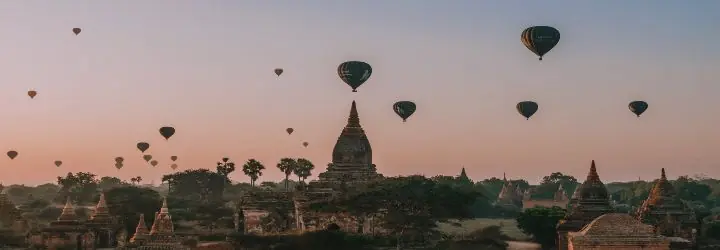Everything you need to know about Burma

Updated February 2017
There has never been a better time to visit Southeast Asia. The region is growing in popularity and is more accessible than ever before.
Despite an influx of tourists, there is still somewhat of an enchanting mystery to countries such as Burma. With cruises available along both the Yangon and Irrawaddy River, this could be the perfect opportunity to discover the beauty of Burma. Visiting places such as Maubin, Bagan and Mandalay you will be able to see why Southeast Asia has become so popular.
If you are planning a trip to Burma, there are a few things you'll need to know. Here is our essential guide.
The country
Burma, also referred to as Myanmar, has the official title of the Republic of the Union of Myanmar, which derives from the Burmese Empire between 1500 and 1000 BC. Situated on the Bay of Bengal with a coastline on the Andaman Sea, it shares its borders with Bangladesh and India to the west, China to the north and Laos and Thailand to the east.
It has a population of around 51 million and has a history of settlers in the early part of the country's formation. Civilisations in Burma included the Pyu who lived in Upper Burma and the Mon in Lower Burma during the ninth century. During the 16th century, Burma boasted the largest empire in Southeast Asia under the Taungoo Dynasty.
Burma became a British colony in the 19th century following the Anglo-Burmese Wars, but gained its independence in 1948. A military dictatorship imposed during a coup in 1962 formally ended in 2011 leaving Burma the country as it is today.
Like a lot of its Southeast Asian neighbours, Burma welcomes travellers from all corners of the globe.
Customs and traditions
Burma's culture is influenced heavily by Indian and Chinese traditions. The multitude of stupas and temples across the country are akin to those in northern India. The largest ethnic group in the nation is Bamar, which accounts for around 29 million of the population. Primarily living in the Irrawaddy River basin, the majority of Bamar are Theravada Buddhists.
They are expected to stick to the basic Five Precepts, which are commitments to abstain from harming living beings, stealing, sexual misconduct, lying and intoxication. Bamar are very spiritual people practising meditation and attending monasteries on a regular basis. Each full moon day they celebrate pagoda festivals, which tend to fall at the beginning and end of the Vassa.
The Burmese are very friendly and welcoming people, it is also considered improper to lose your temper or show too much emotion in public. If welcomed into a Burmese person's home, remember to remove your shoes as a sign of respect.
Currency
Burma deals in the Burmese kyat with the current currency exchange having 1,824.96 kyat to the pound.
Food
Burmese cuisine is inspired by its near neighbours with Chinese, Indian and Mon influences all evident in the country's favourite dishes. A main staple of the region is Mohiga, which is a rice vermicelli ensemble with fish gravy, an orange liquid, coriander and chilli powder. Served normally at breakfast time it can range from sweet to spicy.
Another speciality is Onnokauswe, which is a noodle dish in a thick soup of coconut milk and the addition of chicken. It tends to come with anything from fruit fritters to solidified duck blood. If you want something a little lighter then opt for Laphet thote a salad made with fermented tea leaves and nuts, eaten with rice.
Burma has its own take on the curry with the Myanmar people opting against the use of coconut milk, an ingredient common in Thai curries. Burmese versions tend to be much hotter than what you may be accustomed to, more so than Indian variations, so be careful when ordering in restaurants and cafes.
Stay safe
Burma is one of the safest countries in Southeast Asia, but you need to be wary of petty theft in some of the larger cities. Keep your belongings secured to avoid running the risk of having a bag snatched or losing any expensive items.
The country has a relatively low crime rate due to a large amount of the population being devout Buddhists and wary of retribution in the next life, but still remain vigilant. As an extra safety precaution always have a bit of extra cash spare to cover any unforeseen incidents.